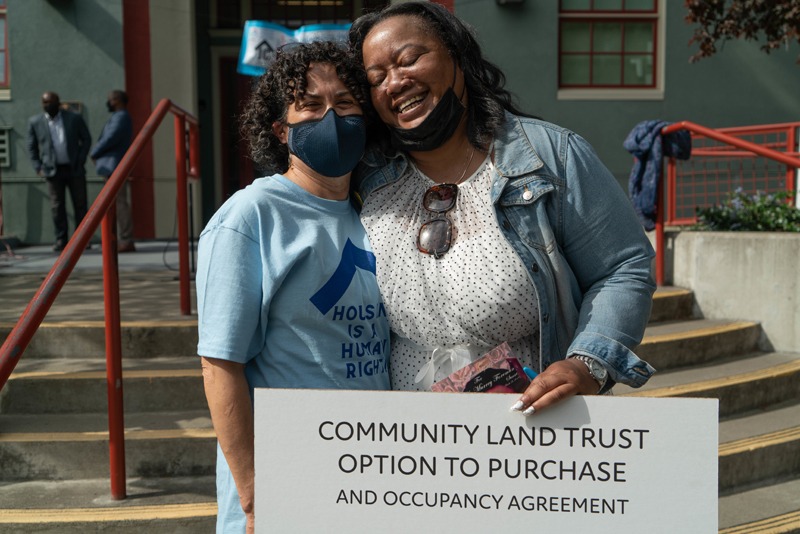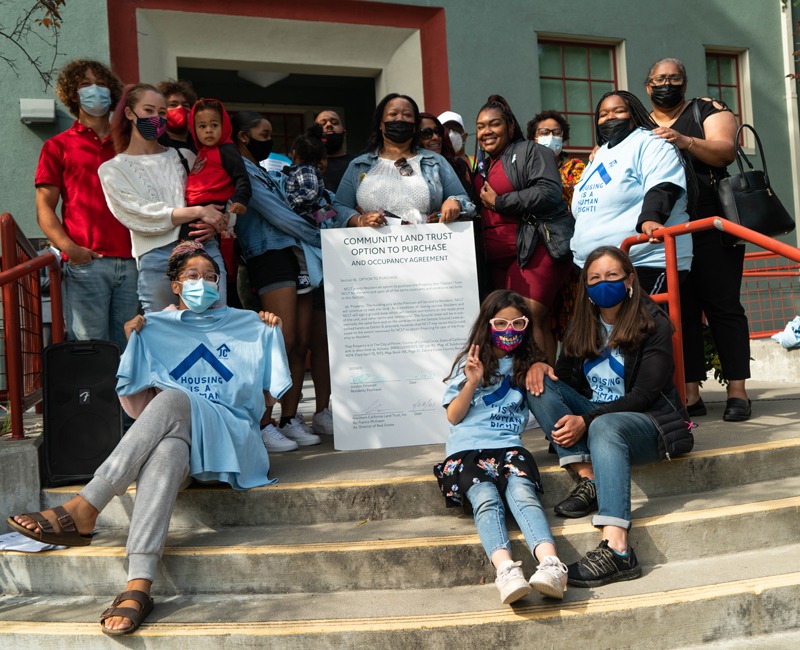
In February 2021, Jocelyn Foreman found out that the home she was renting in Pinole, a small San Francisco Bay Area community north of Richmond, was up for auction, just a few weeks before it was to go for sale. At the auction, Wedgewood Inc., a company synonymous with artificial housing scarcity, put up the winning bid at $600,000.
Fortunately, a new California state law, SB 1079, signed into law in September 2020 thanks to the organizing efforts of Moms4Housing, provides tenants the opportunity to purchase properties when auctioned, but only if they can match the auction price within a 45-day hold period. SB 1079 was designed to reduce land grabs resulting from foreclosure auctions accelerated by the COVID-19 pandemic.
Despite the odds, Jocelyn and her team, Jocelyn’s Corner, were able to raise $100,000 in 45 days as a down payment and got a land trust to sign on to help secure a loan to finance the $600,000 purchase. In April 2021, Jocelyn became the first tenant to buy her home using the new law. In this interview, Jocelyn shares her story.
Thanks in part to Jocelyn’s success story, which highlighted the need for acquisition funding, Governor Gavin Newsom signed a law in July 2021 providing an additional $500 million for SB 1079 foreclosure acquisition funding.
This interview was conducted by Mwende Hinojosa of the nonprofit Sustainable Economies Law Center of Oakland, California. This interview was edited for clarity and consistency.

Mwende: Tell me how the campaign to save your home got started, and how did it come to be called “Jocelyn’s Corner”?
Jocelyn: These are women who have always been in my corner. They just named it as a movement. In various parts of my life, if I didn’t assist them, they were assisting me. They’ve always been in my corner. They claimed it and they named it.
My mother had just died, and I was being retraumatized by seeing the foreclosure notices. Christine [Hernandez of Sustainable Economies Law Center] was telling me I had more options than cash for keys. But then I realized I had to tell people my situation and be naked. I had to know my rights and stand in my power.
I talked to the people Gwen [Gwendolyn Kuhlmann] gave me: Tenants Together and BACLT [Bay Area Community Land Trust]. They told me, “You’re sitting in a good spot. This happened before the pandemic, and you don’t owe her a dime. When you leave, your rights leave.” Then I had a 60-day notice. And I told Christine to pull the trigger. Christine said, you’re going to be extremely vulnerable during this process [of raising money to buy the home]. I knew a lot of things would come up. When things happen to us, we put them in these little boxes and bury them. But then a good wind comes, and those boxes come up out of the ground. It will happen and we’re here.
Christine asked me, “Who else do you want on this journey with you?” So, it was Valerie Gutwirth, Gwendolyn Kuhlmann, and Locke Jaeger. Locke was a game changer and as rooted in Berkeley as I am. We’re both preachers’ kids. She was connected to Berkeley Public Schools Fund. Old money privilege, she was connected to.
Mwende: How do you approach organizing something like buying your home?
Jocelyn: I’m an agent of change. I create systems to produce equitable outcomes. Land trusts, wedded with the funding of SB1079, changed the face of home ownership forever. When I talk to people in the Black community about land trusts, they’re like, “WTF is that?” But a Black lady once told me to learn everything that you can and bring it back to us like you always do, and so I did that.
One other thing I would like to add: can I just say how hard it [raising the down payment money] was? I was moving like that because I was grieving. My mind was all over the place. I had to put things down in a way to focus. Once I was there, I was locked in. That was the biggest thing. I was a caregiver at the same time and working through the pandemic. I surrounded myself with people who held me accountable.
Mwende: Explain the role of personal relationships in your organizing.
Jocelyn: I looked at everyone’s wheelhouse and their assets. All these badass chicks have one. What they all had to give—what we all had to give—is really what made this happen. Learning for me as a coordinator, pulling these women together, and then looking into everyone’s gifts…I thought we’d do good, but I wasn’t totally sure. Having the trust of each other, having connections, utilizing those connections, and exercising good judgement in those spaces. Also, being completely transparent: Christine wanted me to tell her everything—the good, the bad, and the ugly. She said, “I don’t want no secrets.” She had to be able to share that with other people, and I had to trust her. If we didn’t have that kind of relationship, personally, if we couldn’t do that, then this would not have worked. I needed to be able to ugly cry with them.
Mwende: How did your personal experience with housing insecurity inform how you organized?
Jocelyn: I learned how to stand in my power. I would always just keep it moving. Your power leaves when you leave. All the experiences leading up to this taught me how to really look at what’s going on around me and be aware. Because when I received the first [foreclosure] notices, I didn’t even look at the address. It took a few notices for me to realize they were notices for the home I was living in. It’s not a good look to be 50 and homeless. It taught me to pay attention. Through this process, Christine taught me how to read every single thing. Looking at the deeds on property, what land trusts do, what probate is. Before, I didn’t pay attention.
Sign up for our free newsletters
Subscribe to NPQ's newsletters to have our top stories delivered directly to your inbox.
By signing up, you agree to our privacy policy and terms of use, and to receive messages from NPQ and our partners.
Mwende: Why is this story important for others to know about?
Jocelyn: I think it’s important for everyone to paint their own picture. One time when I was homeless, the City of Berkeley gave me a certificate of homelessness! I was in a program the city had. The only way I could get into the program was if I was homeless. HUD [the US Department of Housing and Urban Development] has a certificate of homelessness.
Why does it require a certification to do that program? It means you’re sleeping in places that are not habitable. And HUD certified it! It was imperative for me to change that narrative. I had to use words that described me. And I had to surround myself with people who genuinely knew me.
I had to remember things I had forgotten for years. Saying who I really am and not what those papers say was important. It restored my faith in myself. I had lost it a little bit. I was on my knees. My mom died and now this? It had to be about the [SB 1079 acquisition funding] bill. It had to be about other people. It had to be about putting funding behind it. I couldn’t take negativity and bad memories with me. Just being 100-percent transparent was the ticket for me. Because I am myself.
Mwende: What surprised you about the process?
Jocelyn: 500 million dollars? [The day before, Governor Newsom had signed a bill allocating $500 million to help tenants whose homes are in foreclosure place bids at auction.] Nine hundred [campaign] donors in less than 45 days? I thought we’d do good, but I did not know we were going to do this. I was stunned. I remember the morning that I broke $100,000, my phone was levitating. I looked at the phone and it was John Becker. He’s a teacher at Berkeley High. “He said, ‘You broke $100,000 lady! Cry it up!”
And then I started gagging. I had to pull over. I was so messed up. At the time that this was going on, I was going to Calistoga every day to take care of a wine baron. I was trying not to focus on social media. We had 45 days [to raise enough money to make a counterbid on the home]. Then I would get direct messages: “Tell me about your house? We are going to help you.”
The reach of one person is mind blowing, to know that I was the rock that was thrown, and this is what came back. Malachi 3:7 in the bible says, “Return unto me, and I will return unto you.” A friend told me, “This is our opportunity to give back to you what you gave back to us.” The response alone, I could not…I have no words.
Mwende: Can you remember the turning point during this campaign? When you realized you might be able to pull it off?
It was the moment when we said, “$600,000 is a lot to ask of a community.” Then Christine, who worked with me at the Law Center, replied, “If we have $100,000, we’ll do it” [be able to finance the rest]. And three days later, I had $100,000. That was when we had the conversation in the car where I was gagging. So, it was the moment when we changed the goal [to something more attainable]. Then people started to say, “We’re getting close.”
Mwende: Why is it important to follow the leadership of impacted communities?
Jocelyn: There’s a leader in all of us. The way you surround yourself and align yourself dictates the way people follow you. For the women I’ve been around, they’ve seen me do things that were bigger than me. This was so big for me because it was breaking the cycle forever for my kids. I have five daughters. How they saw me was important to me. And how I saw myself after this changed me forever. So, if there was a woman that was like me or saw herself in me and I did this, then she could do it. I think I wanted that more than anything.
I’m big on takeaways. What could someone like me take away from an experience like this? Having Moms4Housing and their example helped me to be able to do this. Having the courage to stand in it gave them the confidence to push behind me.
It took me a minute to see myself leading this. To see all of this after walking through it is big. If another woman like me can see herself in this process, that was the reason to follow me.
Mwende: How did you maintain your faith during this process that had no clear path?
Jocelyn: I didn’t talk outside of my circle. Any single tear I cried, I cried for four months. At the signing, they had me propped up. Do you have a receipt? Eyes on the prize. No time to cry and fall apart. I didn’t talk to no one outside the circle. That’s how I did it. I was never by myself. Anytime I had to talk, someone was with me. They never left me. When questions came up, it was handled.
For more information on SB 1079, check out this toolkit of resources, case studies, and more.












